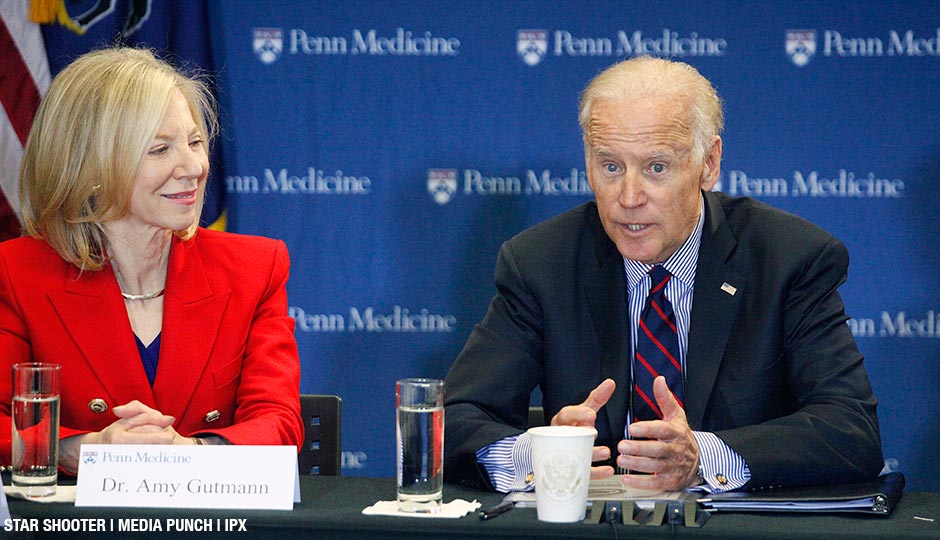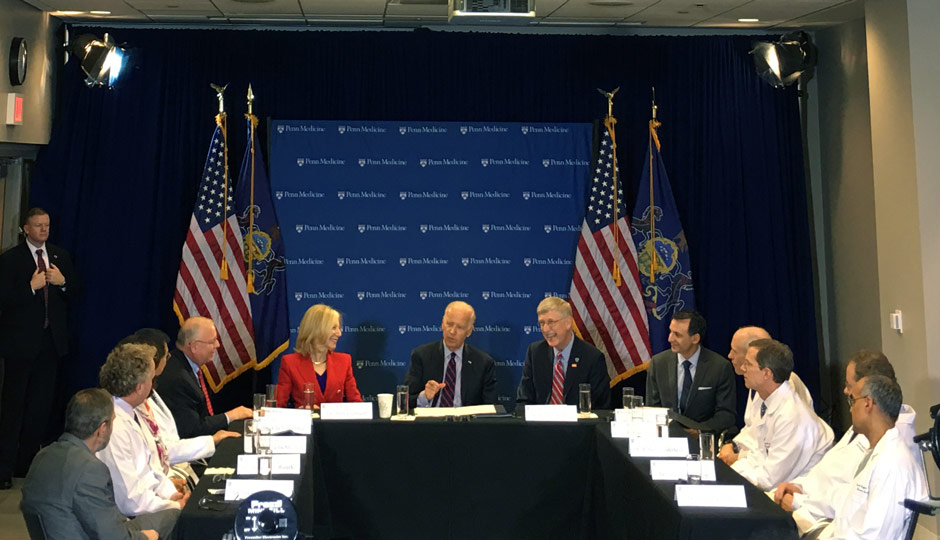At Penn, Joe Biden Spells Out How Cancer “Moonshot” Will Work

Vice President Joe Biden, pictured with Penn president Dr. Amy Gutmann, launches a “moonshot” initiative to hasten a cure for cancer at Penn Medicine’s Abramson Cancer Center in Philadelphia on January 15, 2016.
Joe Biden called it a moonshot, but the vice president says he’s realistic about the fight against cancer. He doesn’t want people to think the push against cancer, announced by President Obama in Tuesday’s State of the Union address, is some over-the-top declaration that we’re going to find a cure for cancer immediately.
“My goal is that we find absolute cures, but for some cancers where we get to the point where we can manage them and they become chronic diseases,” Biden said at Penn’s Abramson Cancer Center on Friday afternoon. “The goal is: Whatever breakthroughs we can make in 10 years, my goal is to make sure we can do it in five years.”
Biden was in West Philadelphia to talk with doctors and kick off the push against cancer, which Biden says is less of a program and more of a way to see how he and the U.S. government can be a “value-add” to the fight against the disease. Biden’s son, Beau, died of brain cancer last year at the age of 57.

Vice President Joe Biden leads a panel discussion with Penn president Amy Gutmann and NIH director Francis Collins. (Photo | Dan McQuade)
The vice president’s appearance at Penn was more a panel discussion than a press conference. He was seated at a table flanked by Penn president Dr. Amy Gutmann and National Institutes of Health director Dr. Francis Collins. Rounding out the panel were 10 Penn doctors, who Biden talked with about their research in finding cures and treatments for cancer. The press and other invited guests were essentially sitting in on Biden listening to what doctors had to tell him about cancer research.
Not that Biden didn’t share his opinions during the event. He referenced a saying his grandfather used to tell him: There are three kinds of politics: Church, union and regular politics, and they’re difficult in that order.
“I hope you’re not offended,” Biden said, “but there are four kinds of politics in America. There’s cancer politics, first.” Biden said that one of the ways doctors can better fight cancer is through increased sharing of information, by giving doctors in places far from Philadelphia access to the same cutting-edge treatments used at Penn. “It’s not even intentional,” Biden said. “There’s a desire to be collaborative.”
“There’s a tradition of holding the data a little too close and we need to change that,” said Collins. “People say it’s like herding cats and you can’t do it, but, well, you can move cats with food … We’ve got $32 billion worth of food.”
The initiative, which Obama will soon be signing an executive order for, is not a project of the NIH. Rather, it is a project across multiple branches of government. Biden believes that collaboration of this kind is necessary for the fight against cancer. He said it’s more than just traditional medical research: Miles of cable must be laid, more digital storage must be budgeted for, etc.
“When I talked about a $20 billion investment in big data… capability people look at me like, ‘What does that have to do with fighting cancer?'” Biden said. “If you live in Philadelphia, you may have access to this great research facility. If you live in 75 percent of this country, you may not have that access.”
Biden also referenced immunotherapy, a promising treatment that could be a breakthrough against cancer. Some of the most encouraging work in that field has been done by Penn’s Carl June. In 2013, Jason Fagone wrote about June’s work in Philadelphia magazine.
“Our 10-year moonshot is using the genetic information to actually prevent cancer,” said Penn Dr. Robert Vonderheide. “Imagine a vaccine that prevents cancer in the first place.” He said current research has developed a vaccine that can, in certain lab conditions, prevent cancer from coming relapsing.
“You understand all the pieces of the puzzle around this table here,” Gutmann said to Biden as the event ended. “If you can be both a spokesperson to advocate for putting those pieces together… I think the moonshot is real, it’s not a fantasy. This is going to work.”
Follow @dhm on Twitter.


